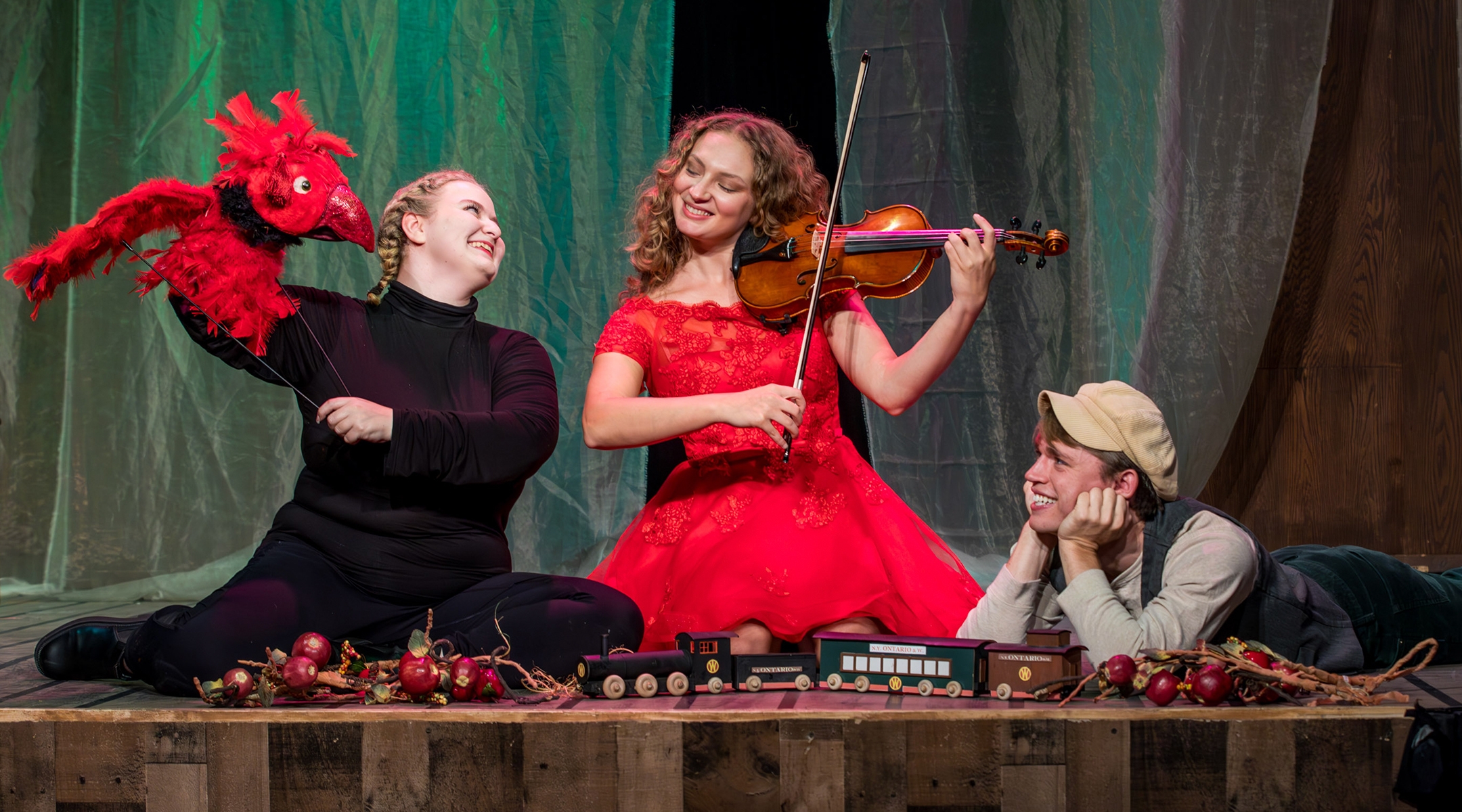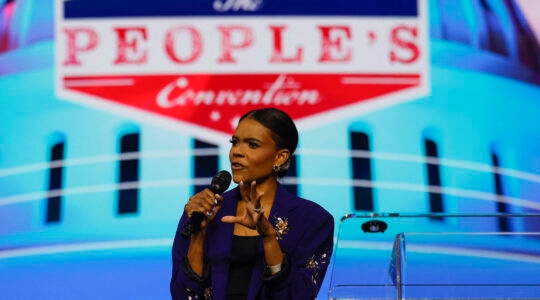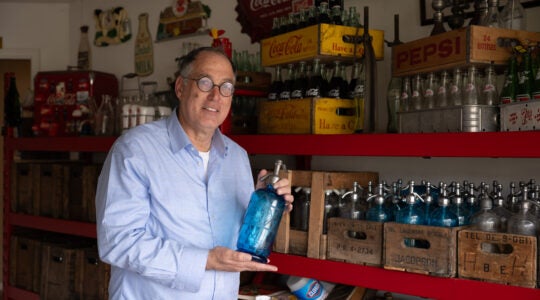(New York Jewish Week) — Just in time for the High Holidays, a new, family-friendly Jewish play will make its Off-Broadway debut on Sunday, Sept. 10.
“Out of the Apple Orchard” is based on the first book of Yvonne David’s acclaimed “Apple Tree” series. The two-book series — a third is forthcoming — follows the Jewish Bieman family as they immigrate from a shtetl in Lithuania, first to New York City and then to the Catskill Mountains. Adam Bieman, the boy whose family life is chronicled in the series, is inspired by the author’s own son, who was coming of age when she began writing the books.
Premiering at Actors’ Temple Theater (339 West 47th St.) on Sunday, just days before Rosh Hashanah, “Out of the Apple Orchard” explores themes of forgiveness and reconciliation — perfectly timed for Judaism’s annual season of self-reflection. During the Jewish months of Elul and Tishrei, which fall in the late summer/early fall, Jews are encouraged to look within, connect to who they’ve been and who they want to be. “Out of the Apple Orchard” follows a Jewish family at the turn of the last century that is doing just that — and in doing so provides audiences with an opportunity for both fun and introspection.
“This play has so many layers,” director Nicole Raphael told the New York Jewish Week. “It’s all about unfolding the story and its complexities. We really see things from the children’s points of view. They see the sentimentality for the Old Country, but also the harsh reality of pogroms and Cossacks; the love that permeates family life, but also the very real mistakes both adults and children make.”
“The play really asks how to handle mistakes, how to mend your ways,” she added. “To me, this is such an important theme — and especially during Rosh Hashanah.”
The “Out of the Apple Orchard” script was crafted by Ellen W. Kaplan, professor emerita of acting and directing at Smith College, who worked closely with David and Raphael to create a staged version that would bring the philosophy behind the story to the fore.
The play opens with Adam Bieman dreaming that he and his Bubbe are in a sepia-toned photograph. The picture comes alive as the family matriarch relates tales of the shtetl — setting the scene for what is to come. When the play premiered in Orlando in 2016, the staging of this scene was reminiscent of the nightmare sequence from “Fiddler on the Roof.” In the New York production, however, the ancestors aren’t warning of changes to come. Instead, Bubbe is detailing the brutality of the pogroms and the importance of leaving Lithuania for a new life.
The year is 1910, and the Bieman family leave Europe to find their fortunes in America. After a time on the Lower East Side of New York City, though, Adam’s father becomes ill. The Biemans are advised to head to the Catskills, with the idea that mountain air will do Papa a world of good. So they head north.
But the Catskills are as harsh as the city or the shtetl, albeit in different ways. Poverty persists. Papa is still ill. The family is hungry. Adam, tempted by ripe red apples in a nearby orchard, shoves some pieces of fruit under his hand-me-down cap. Later, riddled with guilt, he becomes haunted by his thievery. Through this and other travails, Adam and his family are faced with a central question: How can they retain their moral understanding of the world when hardship abounds?
“The story is almost a continuation of ‘Fiddler on the Roof,’” Raphael said. “Imagine what would happen when Tevye arrived on the Lower East Side — you know, so many immigrants got sick at the turn of the last century. Adam’s Papa was a brilliant tailor, but now he’s sick. Still, he brought his family to America, did everything so they could to thrive. We want the audience to fall in love with Papa, to appreciate him for how he tries to support his family.”
And, indeed, Adam’s Papa cares deeply about his family. He worries about not being able to care for them, conceding eventually that they should help him sew the suits he was once famous for making. “With my family helping me finish the suits, we will not starve,” he says in his central scene. “My heart is kvelling and swelling with love.”
Throughout the play, a fiddler, portrayed by Victoria Chaieb (who both performs and wrote the violin music), follows Adam across the stage, emphasizing his internal process. Ben Rauch composed and orchestrated an original score inspired by traditional Yiddish and Jewish melodies and, to a lesser extent, vaudeville-inspired songs.
Extensive puppetry adds an otherworldly — even mystical — air to the staging, too. For example, as the young protagonist descends into a spiral of guilt over his thievery, a large red bird flutters around him. In the book, Adam simply glimpses a red bird as he dwells on his moral dilemma while at school. “It’s visually thrilling,” author David told the New York Jewish Week. “It represents Adam’s conscience.”
In addition to directing the play, Raphael has created an accompanying curriculum in partnership with Park Avenue Synagogue, where she’s a second-grade Hebrew school teacher. The lessons include themes of teshuva, or repentance, Yiddish culture and the Jewish history of the Catskill Mountains. Eventually, she envisions the play and the curriculum being distributed across the country and used in classrooms everywhere. “I see this as the continuation of our oral history, both for our communities and everyone else in the modern day,” she said. “I’ve been an educator in Manhattan for 15 years at different synagogues; I really feel that directing the play and developing the companion curriculum is like everything I’ve worked on all coming together.”
While the themes of the play are rooted in Jewish culture and history, Raphael and David both told New York Jewish Week they see the play’s overarching theme as a universal one.
“There’s so much upsetting divisiveness in this country,” David said. “I think we need to come together. We’re squandering our lives on anger and discrimination. In the end, we’re all in this world together and it’s up to us to make the best of everything, not the worst.”
“Out of the Apple Orchard” is playing at Actors’ Temple Theater (339 West 47th Street) from Sunday, Sept. 10 through Thursday, Sept. 14. Tickets and info here.
The New York Jewish Week brings you the stories behind the headlines, keeping you connected to Jewish life in New York. Help sustain the reporting you trust by donating today.





